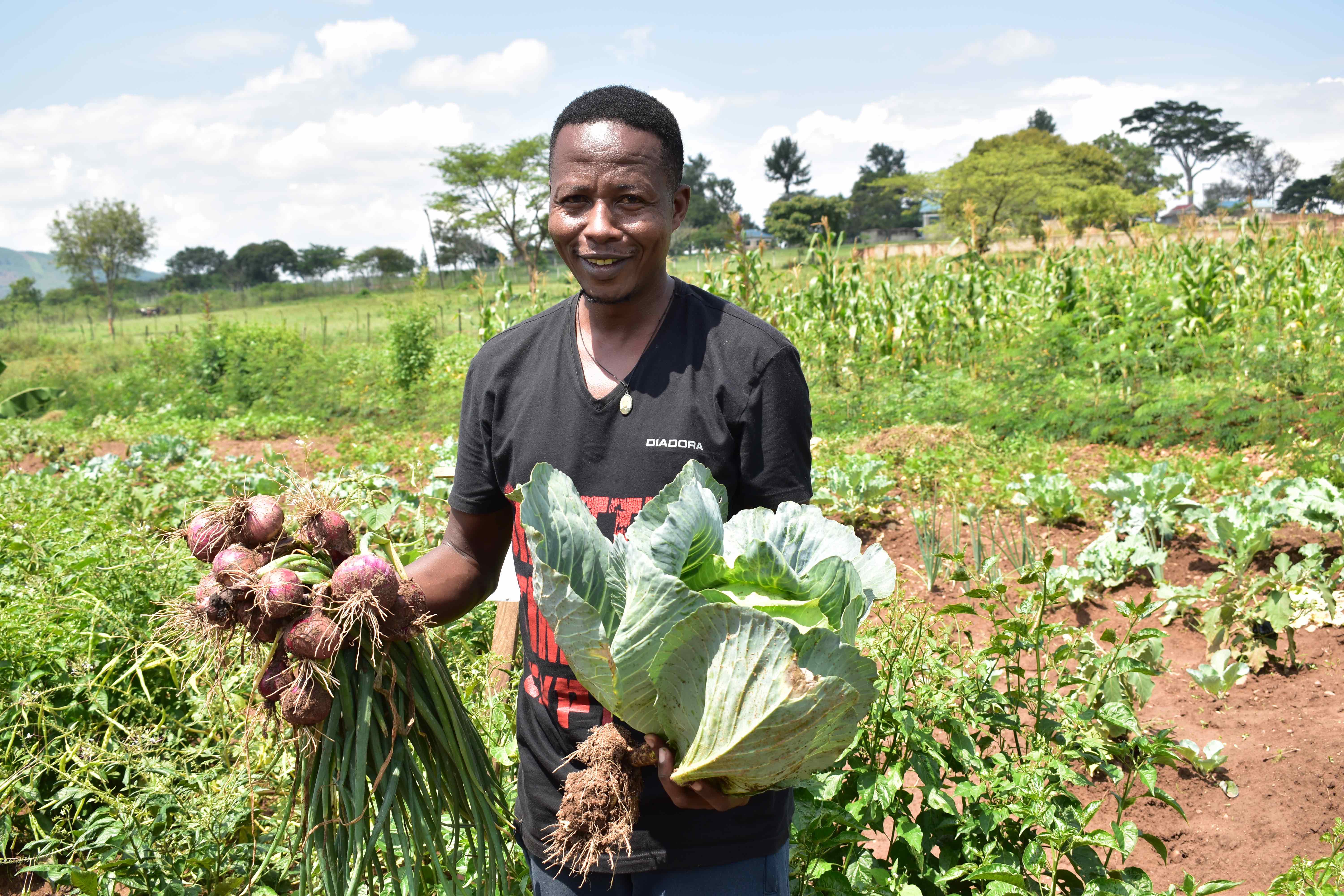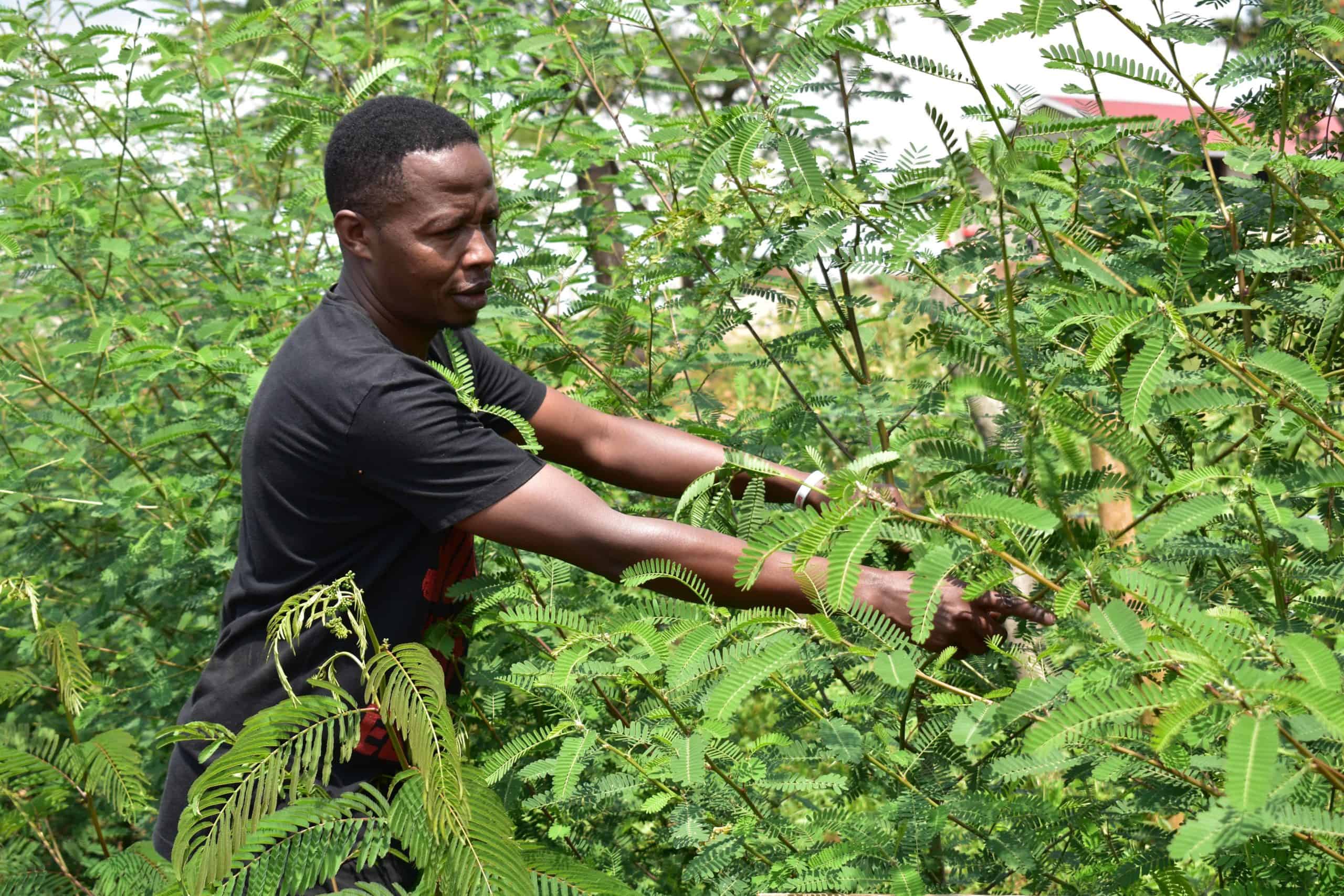Richard joined the TREES team in 2016 and has more recently taken on the role of Country Trainer. As Country Trainer, he oversees the training of TREES staff and technicians and supports farmer training. He also coordinates training for other organizations and partners through workshop planning and training demonstrations. Richard has been integral in developing the TREES Training Site in Mbale, Uganda. His design skills have been invaluable in establishing the site and he’s been hard at work planting the site’s trees and crops. The site will serve as a demonstration site for TREES staff, farmers, and partner organizations. TREES Uganda Field Development and Communication Liaison Charity Nalwoga spoke with Richard about his time at TREES, his goals, and what he’s learned along the way.

Tell us a little bit about yourself.
My name is Richard Ssali Kaggwa and I am a Ugandan living in Mbale at the moment. I grew up in Masaka District with my mother and I’m the second child out of seven. I am a Teacher and IT Specialist by profession and I did my degree at Nkumba University in Entebbe. I’m also a Boy Scout, a Badminton coach and technical official as well as a certified First Aider. I have worked with communities all my life right from the tender age of 10 as a scout while I was in Primary Four.
I’ve volunteered with various community-based organisations such as the Uganda Red Cross Society and Right to Play. I am a huge sports fan especially for Badminton and I normally coach and play in my free time.
I am currently working for Trees for the Future as the Country Trainer for our Training Site in Mbale.
When did you first become interested in working with smallholder farmers and sustainable agriculture techniques?
When I became a Boy Scout, I learned that parts of our laws encourage scouts to be helpful and to conserve nature. It was at that point that I realized my passion for helping others and taking care of the environment. I went on to work with the community under the Food for Life project, run by the Boy Scouts, and got involved in establishing small vegetable gardens in homes to improve the nutrition of families. This further introduced me to agriculture and taught me a few things about sustainable agricultural techniques. I later started volunteering with TREES in 2013 where we worked with smallholder farmers.
Tell me about your time and work with TREES in Lira as a technician.
When I became a technician with TREES in 2016, I was so excited to work with all these farming families. It was such a good experience working in Lira. What I loved most about my role was interacting with farming families and people who were in dire need of a reliable income after going through many years of civil strife (the Kony Rebels). Seeing them progress after the establishment of the Forest Gardens was amazing and quite fulfilling.
What are some of the challenges you faced during your time in Lira?
The number one challenge was the culture of the people where men have the power in decision making, and the lack of land ownership by women. Yet, women were engaged fully in farming and taking care of the family, it came as a big surprise to me.
Based on your experience, how would you describe the growth of farmers before and after the TREES’ projects in Lira and Kole?
Before, farmers depended on monocropping, use of chemicals, bush burning and many other poor methods of farming. Children were malnourished, food was limited in the homes and the overall diet was lacking. However, as we conducted training and interacted with farmers, many changed their attitude towards these bad practices. We have witnessed improvements in household incomes and farmers have been able to save from the sales of their produce. Nutrition has greatly improved due to permagardening as well.
What pushed you to pursue the role of Country Trainer?
I felt that I could contribute towards capacity building and the expansion of TREES’ impact in Uganda by using my expertise and sharing the knowledge and skills I’ve acquired through my career.
How would you describe your transition and growth from a technician to the Country Trainer?
It has been smooth, though lockdown interrupted my transition since I had just reported to the new station. But, nevertheless, I picked it up quickly and was able to do my work with ease.
There are many languages and dialects where you work. How are you coping with the change in regions and languages? How have you been able to work in areas where you do not speak the common language?
Mount Elgon region has the Gishu Bantu speaking people, therefore, being also from the Bantu speaking group (Baganda) myself, I do understand the language very well and soon I will be able to speak it with ease. Besides that, people are also very friendly and welcoming. In Lira, I learned the basic phrases, like greetings and asking for the gardens etc. When we are training we rely on Lead Forest Garden Farmers who can speak English and can interpret. The Northern part of Uganda (Lira) is relatively easier on English than the East (Mbale).
The progress at the training site in the past six months has been tremendous, what unique things are you doing to create a “perfect Forest Garden?”
First of all, thank you for appreciating my work. I am proud of how far the site has come in recent months and how the Forest Garden continues to grow. We have already had our first harvest with so many cabbages, onions, green pepper and maize to share with staff and the community around. My formula is simple really. I have a few things that make my work easy and enjoyable and they include loving what I am doing, having a team that is motivated and interested in bringing change to the region, a good working environment, and the support from the Country Director, Regional Coordinator and all members of the Training Department.
Any career advice you have for our readers?
One should always be sure that they love what they are doing and aim towards career development. When you love your job, it comes easy to you and you are able to enjoy your work, which produces good results.
